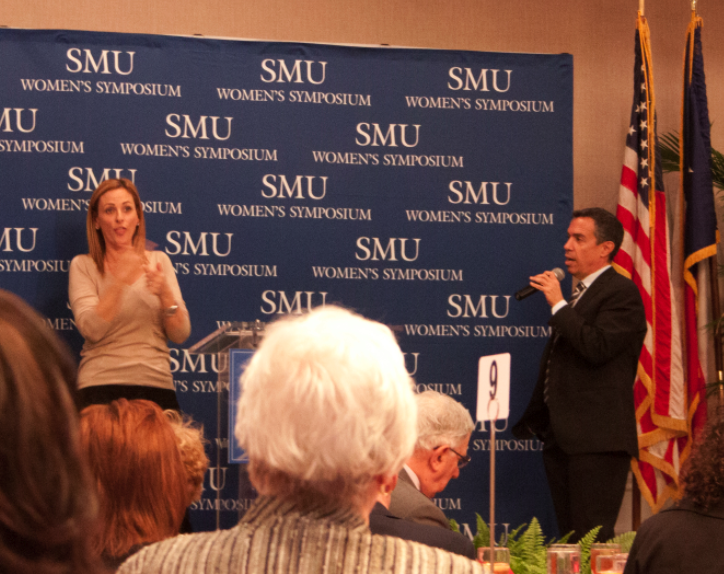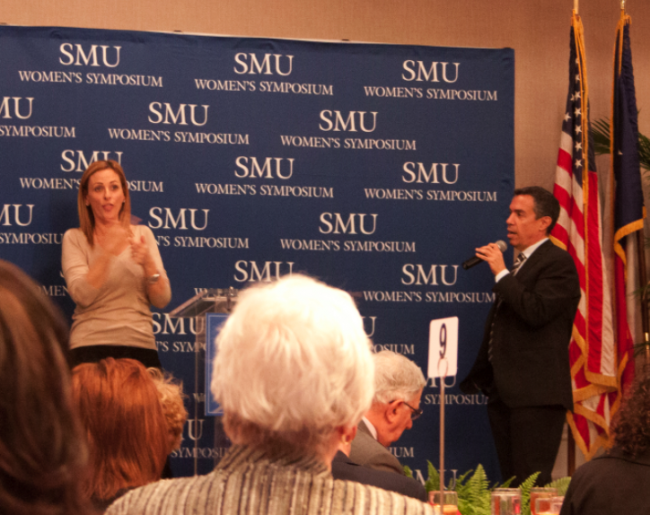
Marlee Matin, with assistance of her long time interpeter Jack Jason, delived the keynote speech at the 47th Annual Women’s Symposium at Southern Methodist University. (Jan Anderson/The Daily Campus)
Barrier-breaking, Oscar-winning actress Marlee Matlin delivered a message of tenacity and perseverance Wednesday at SMU’s 47th annual Women’s Symposium.
“It’s been 25 years since a columnist proclaimed my Academy Awards win a pity vote,” Matlin said. “Yet I’m still here.”
Notably known for her appearance on Donald Trump’s “The Celebrity Apprentice,” “Dancing with the Stars” and the new hit series “Switched at Birth,” Matlin has made major strides for the hearing impaired community as an actress and advocate of change.
As the director of SMU’s Women’s Center, Karen Click was delighted to have Matlin as the keynote speaker for the Women’s Symposium. Click felt the hurdles of Matlin’s life and the work she does for deaf inclusion embodied the vision of the symposium’s founder, the late Emmie V. Baine.
“We chose Matlin as our speaker because the total of her life spoke to our theme, ‘Women as Agents of Change,'” Click said. “We wanted to come together and celebrate, reflect and honor those women who have really transformed the planet.”
As Matlin approached the podium microphone, she signed with her hands, “I don’t need this, Jack does.”
Jack Jason, her longtime friend and interpreter, accompanied her to the podium where she provided the audience with glimpses of the unglamorous obstacles that made marks in her life’s journey toward success.
“I grew up in the suburbs of Chicago, and life in our house was like an episode of ‘The Brady Bunch.’ You had to keep on, keep on, keep on proving yourself,” Matlin said.
Proving to the world that a hearing impaired girl born in the suburbs of Chicago in 1968 was capable of becoming a successful actress despite the ridicule from others and the unsettling emotions she felt about her own impairment.
“I battled a drug addiction from the time I was 13 to 21 years old,” Matlin said. “I received my [Oscar] nomination while I was in rehab.”
After accepting the nomination and completing rehabilitation, 25 years later Matlin is still sober and still a working actress.
What many do not know is that Matlin was not born deaf. She was capable of talking and hearing until she was 18 months old when doctors diagnosed her as profoundly hearing impaired.
“What happened, no one really knows,” Matlin said. “My parents were devastated. How could they raise a deaf child?”
Doctors then told her parents that Matlin should attend a school for the deaf. Her parents were never satisfied with that idea because they did not want their child to go to bed each night without having someone to tell her they loved her.
So instead they defied the doctors and raised Matlin at home.
“In 1968, it was a novel concept to send a deaf child to a hearing school,” Matlin said. “My parents encouraged me to explore and be independent. Sometimes I got a little too independent, but it was all a part of growing up deaf or not.”
Her parents’ defiance and determination to raise Matlin as a normal kid regardless of her impairment eventually rubbed off.
“My parents showed me that if I had the will, the desire and most importantly the opportunity to make a change happen for myself, despite what people thought of me, I could be whatever I wanted to be,” Matlin said.
Symposium attendee and SMU senior environmental engineering major Ingrid Castillo admired the willingness and desire Matlin expressed. She felt empowered by Matlin’s message.
“I agree with this idea that if you will it then it will happen,” Castillo said. “You don’t need someone else’s approval. It was important to see and witness a strong independent woman.”
Although Matlin’s parents raised her to be independent and fight for what she wanted, she admits her mother was not always convinced that going to Hollywood and becoming an actress was ideal.
“In her mind, no one would ever give a deaf woman a chance in Hollywood,” Matlin said. “I was determined to follow my dreams and fight for what I wanted.”
After receiving the infamous pity depicted Academy Award and later a Golden Globe, Matlin has achieved more than she ever envisioned including four Emmy nominations, two People’s Choice Awards and numerous other award nominations.
She’s also a wife and mother to four children, and she credits her parents for instilling in her the fight she needed to dream big and define her own destiny.
“Life is about having the courage to dream and affect change despite what barriers are out there,” Matlin said. “No matter how society labels us, in the end success comes as it can to anyone.”









